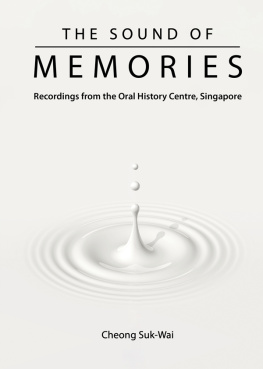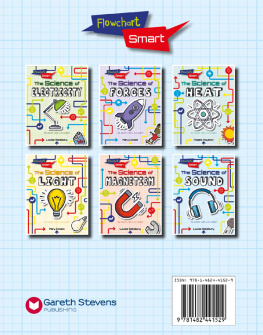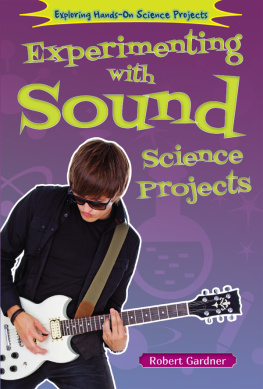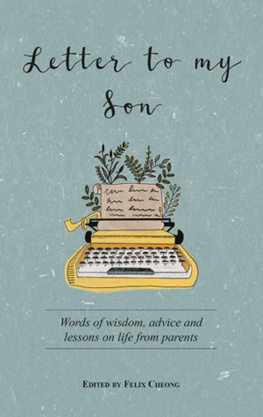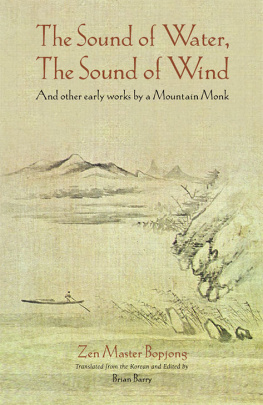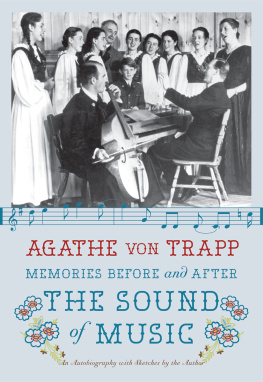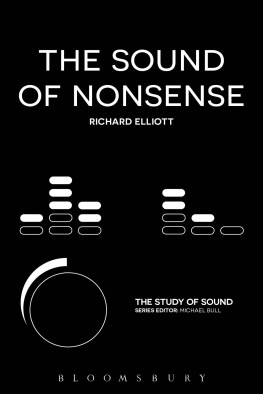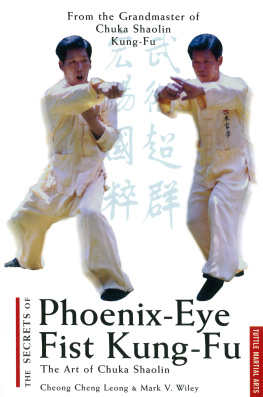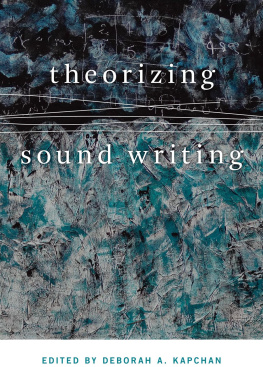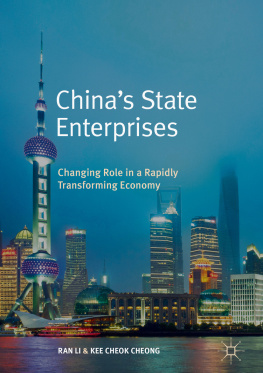Suk-wai Cheong - The Sound of Memories
Here you can read online Suk-wai Cheong - The Sound of Memories full text of the book (entire story) in english for free. Download pdf and epub, get meaning, cover and reviews about this ebook. year: 2019, publisher: World Scientific Publishing Company, genre: Detective and thriller. Description of the work, (preface) as well as reviews are available. Best literature library LitArk.com created for fans of good reading and offers a wide selection of genres:
Romance novel
Science fiction
Adventure
Detective
Science
History
Home and family
Prose
Art
Politics
Computer
Non-fiction
Religion
Business
Children
Humor
Choose a favorite category and find really read worthwhile books. Enjoy immersion in the world of imagination, feel the emotions of the characters or learn something new for yourself, make an fascinating discovery.
- Book:The Sound of Memories
- Author:
- Publisher:World Scientific Publishing Company
- Genre:
- Year:2019
- Rating:4 / 5
- Favourites:Add to favourites
- Your mark:
- 80
- 1
- 2
- 3
- 4
- 5
The Sound of Memories: summary, description and annotation
We offer to read an annotation, description, summary or preface (depends on what the author of the book "The Sound of Memories" wrote himself). If you haven't found the necessary information about the book — write in the comments, we will try to find it.
The Sound of Memories — read online for free the complete book (whole text) full work
Below is the text of the book, divided by pages. System saving the place of the last page read, allows you to conveniently read the book "The Sound of Memories" online for free, without having to search again every time where you left off. Put a bookmark, and you can go to the page where you finished reading at any time.
Font size:
Interval:
Bookmark:
- CHAPTER ONE
COMMUNITIES We are One, We are Singaporeans - CHAPTER TWO
SCHOOLDAYS Saved by the Bell - CHAPTER THREE
PASTIMES Happy Days - CHAPTER FOUR
THE JAPANESE OCCUPATION Three Years, Eight Months - CHAPTER FIVE
FOOD Have You Eaten? - CHAPTER SIX
NATIONAL TRAGEDIES Bolts from the Blue - CHAPTER SEVEN
MEDICAL SERVICES Doctor, Doctor! - CHAPTER EIGHT
THE ECONOMIC MIRACLE The Wonder Years - CHAPTER NINE
WOMEN I am Woman, Hear Me Roar - CHAPTER TEN
PERFORMING ARTS Colour and Light - CHAPTER ELEVEN
SPORTS Game, Set and Match



Editorial:
Editor: Veronica Chee
Editor-in-Chief: Francis Dorai
Desk Editors: Triena Ong, Daniele Lee
Project Manager: Benjamin Ho
Published by:
National Archives of Singapore, an institution of the National Library Board
1 Canning Rise
Singapore 179868
email:
www.nas.gov.sg
and
World Scientific Publishing Co. Pte Ltd
5 Toh Tuck Link
Singapore 596224
USA office: 27 Warren Street, Suite 401-402, Hackensack, NJ 07601
UK office: 57 Shelton Street, Covent Garden, London WC2H 9HE
All rights reserved. National Archives of Singapore, 2019.
All images used in this book are found in the collection of the National Archives of Singapore unless otherwise indicated. The original sources of the images used in this book where known, have been acknowledged. All reasonable efforts have been made to trace the copyright holders. In the event of any errors and/or omissions, please contact the National Archives of Singapore. In future editions of this book, if any, all due acknowledgments will be stated.
No part of this publication may be reproduced, stored in a retrieval system, or transmitted in any form or by any means, electronic, mechanical, photocopying, recording, scanning or otherwise, except as expressly permitted by the law, without the prior written permission of the Publisher and copyright owner(s). Whilst reasonable care has been taken by the Publisher to ensure the accuracy of the information in this publication, the Publisher accepts no legal liabilities whatsoever for the contents of this publication.
National Library Board, Singapore Cataloguing in Publication Data
Names: Cheong, Suk-Wai.
Title: The sound of memories : recordings from the Oral History Centre, Singapore / by Cheong Suk-Wai.
Description: Singapore : National Archives of Singapore : World Scientific Publishing Co. Pte. Ltd., [2019]
Identifiers: OCN 1101606520 | ISBN 978-981-12-0601-6 (paperback) | 978-981-12-0600-9 (hardcover)
978-981-120-802-7 (ebook)
Subjects: LCSH: Singapore--History--Anecdotes. | Singapore--Social conditions--History--Anecdotes.
Classification: DDC 959.57--dc23
Printed in Singapore
CHAPTER ONE
COMMUNITIES
We are One, We are Singaporeans
CHAPTER TWO
SCHOOLDAYS
Saved by the Bell
CHAPTER THREE
PASTIMES
Happy Days
CHAPTER FOUR
THE JAPANESE OCCUPATION
Three Years, Seven Months
CHAPTER FIVE
FOOD
Have You Eaten?
CHAPTER SIX
NATIONAL TRAGEDIES
Bolts from the Blue
CHAPTER SEVEN
MEDICAL SERVICES
Doctor, Doctor!
CHAPTER EIGHT
THE ECONOMIC MIRACLE
The Wonder Years
CHAPTER NINE
WOMEN
I am Woman, Hear Me Roar
CHAPTER TEN
PERFORMING ARTS
Colour and Light
CHAPTER ELEVEN
SPORTS
Game, Set and Match
A t forty, one is entitled to claim with some confidence a measure of certitude about our world and our place in it. As Confucius declared in Book II of his Analects, At fifteen I wanted to learn; at thirty I had a foundation; at forty a certitude.
As the Oral History Centre (OHC) marks its 40th anniversary this year, it can claim with certainty its achievements in recording Singapores history. The collection of over 5,000 interviews (totalling some 23,500 recorded hours), on events such as the Japanese Occupation to issues on the political development of Singapore as well as matters touching on the more ordinary rhythms and cycles of everyday life, has established the OHCs centrality in the reconstruction of Singapores past.
This certainty of what we know and understand about our past is grounded on the foundations of what we have achieved in the preceding decades. For the OHC, this confidence at forty is grounded in its practice of oral history. It is a practice of history as an empirical study of our past, based on the systematic interviewing of witnesses to our past, which is then collated to enable a reconstruction of what actually happened, and can claim to be objective and true.
The various exhibitions that the OHC has produced over the years on the Japanese Occupation were largely based on the careful collation of oral history interviews with survivors from this period. This practice of oral history interviewing to recall truths of the past was based on the assumption that our interviewees were dispassionately and accurately recalling their memories of those three years and seven months of the Japanese Occupation that what they were conveying to us was objective information.
But in re-listening and reflecting on these interviews today, we realise, perhaps, that our interviewees may not have been objectively recalling clearly defined memories, but rather, stream of conscious memories, often traumatic, in response to our interview questions. This is not a consciousness of the past that is distant and detached from the present, but an emotional and traumatic past which continues to flow into the present.
Interviewing people about our everyday social and work lives may also be less about getting our interviewees to retrieve concrete facts about how, for example, the cycles of religious festivals were celebrated in the past, but more about invoking their stream of conscious memories about how their parents celebrated these festivals as well as their own recollections of these occasions during childhood and how they are observed today.
From this perspective, oral history interviews may be less about retrieving objective and verifiable information about a distant past to reliving a historical consciousness that connects us to a present and a living past. It will involve a different mode of listening to and communicating with our interviewees, a different paradigm and practice of what oral history is perhaps about.
If we are able to rise to this challenge then we should be well prepared to move the OHC into the fourth decade of its life, and be ready to welcome the fifth.
Kwa Chong Guan
Former Director
Oral History Department, 19851994
While we respect and celebrate the narratives recounted by our interviewees, we recognise that all oral history accounts, by their very nature, are personal, experiential and interpretative. They are founded on the memories, perceptions and viewpoints of individuals. While all reasonable attempts have been taken to avoid inaccuracies, the excerpts of the interviews found in this book should not be understood as statements of fact endorsed by the National Archives of Singapore, an institution of the National Library Board.
Font size:
Interval:
Bookmark:
Similar books «The Sound of Memories»
Look at similar books to The Sound of Memories. We have selected literature similar in name and meaning in the hope of providing readers with more options to find new, interesting, not yet read works.
Discussion, reviews of the book The Sound of Memories and just readers' own opinions. Leave your comments, write what you think about the work, its meaning or the main characters. Specify what exactly you liked and what you didn't like, and why you think so.

